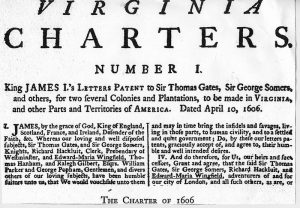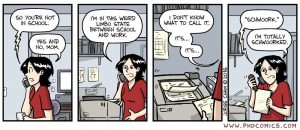As a historian, when I think of charters, the first things I think of are royal charters.


The first result when you Google charter, on the other hand, is Charter Telecommunications Company because of course.
But as members of the new Praxis Fellowship cohort, my fellow fellows and I tried to chart (I’m sorry) a very different path. The result of our work, The Praxis Charter, 2017-2018, is the first thing we ever created together.
http://praxis.scholarslab.org/charter/charter-2017-2018/
Transparency is one of our core values, so I am going to use this post to reveal the process by which we made this document.
Our charter’s first draft was written in a jam session in a Scholars’ Lab meeting room, and the fact that we are all teachers was readily evident. We privately brainstormed, we paired and shared those ideas, and then we had a class discussion with Christian at the technological helm. I often think of grad school as a lesson in liminality.

“Piled Higher and Deeper” by Jorge Cham www.phdcomics.com
That was on full display as we drew on the techniques we use to facilitate classroom discussions to jumpstart our own collaborative work. The liminality of grad school isn’t always to its credit, but in this case, the results were lovely. As a teacher and a historian of education, I spend a lot of time thinking about pedagogy. The pedagogy modeled here made my heart happy! We melded the skill sets of both teachers and students pretty seamlessly to create a productive partnership.
Our conversation always seemed to come back to values. Values are, I think, the core of this document. Of course, for every positive value, there is an equal and opposite disvalue. The opposite of humility is egotism. The opposite of flexibility is rigidity. The opposite of transparency is obfuscation. I think this connects to a comment my fellow Torie made, that writing this charter was almost cathartic, because we could list every problem we had encountered with group work and essentially say: not that.
This, of course, points to the idea of conflict. As our joyful leader Brandon Walsh noted, past Praxis cohorts have tended to avoid naming conflict in their charters in the hopes that their silence would prevent it from ever rearing its ugly head. Think of conflict as the he-who-must-not-be-named of group work, if you will.

Ignoring conflict didn’t really work out for the Ministry of Magic though, and I doubt that the academy fairs much better. My hope is that by setting out clear goals, values, and strategies for coping with conflict we will enable our future selves to handle disagreements with aplomb and grow from them, rather than shrink from them.
Perhaps the most radical value embodied in our charter is our commitment to “the creation of a participatory democracy.” Participatory democracy is an idea coined by one of my favorite historical figures, civil rights and feminist icon Ella Baker. Participatory Democracy embraces two ideas, “a decentralization of authoritative decision-making and a direct involvement of amateurs or non-elites in the political decision-making process.“ Participatory democracy seems like the perfect fit for the Praxis Program as we are all relative amateurs in the digital humanities, and we have been given the task of working and learning together. It also just seems to fit our collective personality. When we talked about past Praxis strategies, we decided we didn’t want to divide and conquer the tasks ahead like many previous years had. We wanted to work on individual elements of our project together so that we could get the most out of our training. This would also allow us to commit to a truly shared vision.
In so many ways, a charter is a reminder of our deeply held values. We all carry around ideals of honesty and creativity, kindness and diversity, but writing out a charter makes you actually reflect on those values and why you hold them dear. Writing a charter allows you to reflect on what it is you like about collaborative work - and what it is you don’t, and then make a promise to yourself and to others to try and embody the best of what collaboration has to offer.
As for our radical experiment in participatory democracy, I can already hear people asking, is that practical? The true answer is: I don’t know. But Praxis seemed like just the place to try it out.
